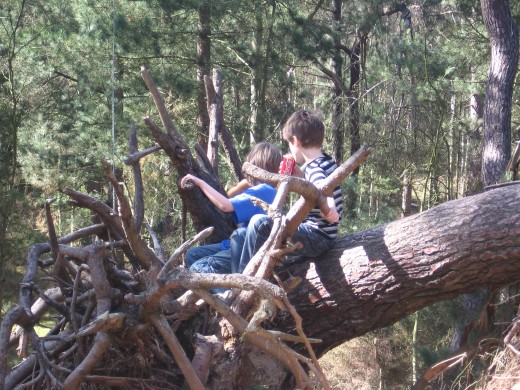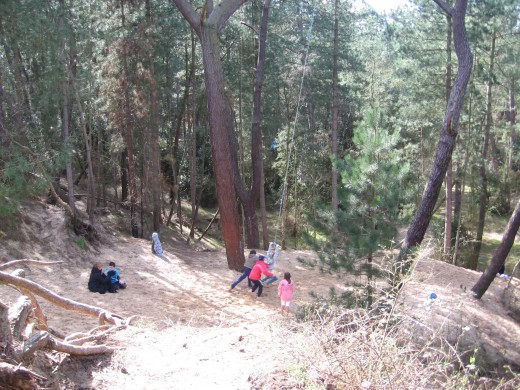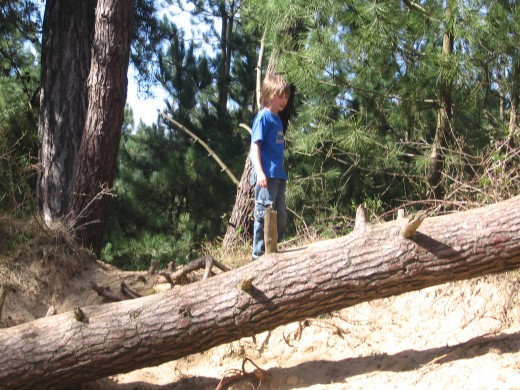Do Kids Still Climb Trees?
Do children still climb trees? It was a question recently asked by a fellow hubber - initially I began to voice my thoughts and opinions in the question and answer section of hubpages. However, though the question is indeed quite simple, I found that it raised a lot of thoughts in my mind concerning modern day parenting and today's young generation.
Most people of a certain age will recall childhoods spent outdoors, playing on streets; in parks; perhaps in woodland. Certainly, climbing trees was a common pursuit of children - although some were certainly better than others. Playing outside meant children made their own entertainment - without the trappings of media and games consoles, play was creative, innovative and communicative. Many children would play outside for the best part of the day, weather permitting.
Playing outside with their peers meant that children naturally acquired essential social skills, such as the ability to communicate, compromise and be assertive. Children learned to take risks and to be aware of their own strengths and weaknesses. What's more, they got a lot of exercise, and burned off more energy than many of today's children. Children need to move around a lot, it is almost an integral part of their very being. Even in sleep, children move about more than adults. With ADD and ADHD becoming an all too common diagnosis, it's interesting to wonder whether it would be any different if children were given the freedom to explore, climb, and run about for hours, on a more regular basis.

Yes, But Do Kids Still Climb Trees?
The short answer is, yes. If today's children are provided with the right opportunities and environment, then activities such as tree climbing are still very much enjoyed. One of the points we should ask ourselves, as parents, is just how often our children today are actually given the chance to indulge in these timeless pursuits.
Today's children do not enjoy the freedoms of yesteryear because most of the time parental anxiety prevents them from roaming very far from home. Whether these are anxieties rooted in true danger, or fruitless paranoia, the end result is the same. We are raising a generation who spend far more time inside the home than any who have gone before them. Even when children do spend time outdoors, it is all too often in a family environment with supervision. It is almost like comparing free range hens with caged hens, although I admit that this comparison is a little harsh. The truth of the matter is that parents today restrict their children out of love, fear (real or imagined) and potential dangers.
And not only that, but many of our local towns have become so built up over the years that a lot of the areas that provided enjoyment for children over the years are simply not there anymore. Green spaces are fewer, making way for ever-increasing houses and new roads. Often, there will not be any suitable trees for climbing in the vicinity of a child's home at all. Traffic has also increased drastically, and is possibly the number one factor in parental curtailment of children's freedom. Most of us do not live in quite the same environment inhabited by previous generations.
When I am at home with my children, with our postage-stamp-sized garden out the back and the trappings of modern life conveniently accessible inside, there is not a lot of talk about climbing trees. There might, instead, be talk about playing on the wretched games console, having a friend round (but not to climb trees) seeing a movie, going for a kick-about with a ball (nothing wrong with that) or going into town to buy something that will end up being a five-minute wonder. All this, of course, is a world away from the types of childhood activities indulged in days gone by. The truth is, no matter how we hope and imagine our children will turn out when they are little bundles of new, tiny love in our arms, unless we live in a rural idyll unattached to the mainstream, then the trends of society and the media will almost certainly make an impression upon our children. Today, the pursuit of tree climbing must compete with the trappings of modern day consumerism, such as the next 'big' toy, games consoles, computers, TV and social media. The problem is that most of these alternatives are addictive to our children, providing them with fast-moving, ever-ready entertainment at the touch of a button. Sadly, and all too often, the world inside a computer game or a cyber existence online can be more alluring than 'real' life and simple activities like climbing trees.

Tree Climbing Today Competes with Social Media and Virtual Worlds
But even though my children thoroughly embrace modern living with all its good and bad points, and my oldest son is obsessed with his xbox 360, all I have to do is transport them to some local woods - brimming with sturdy trees, low branches, inclines and thick undergrowth, with no inkling of any type of screen in sight - and I suddenly realise that they have not lost the ability to enjoy more traditional childhood pursuits after all. In fact, they naturally gravitate towards the trees with the best branches, to see how high they can get. They do not need to be encouraged to do this; they do it as a matter of course. Tree climbing can be competitive, imaginative, or just simply fun. It can be an activity in itself, or part of a game involving look-out posts and spies. Trees are still climbed by children, just because they can be. You might not think that the young of today are remotely interested in the pursuit of climbing trees, but perhaps you are simply in the wrong place at the wrong time. Tree climbing might not take precedent over the Playstation, but if you take the Playstation (and all the other offenders) away, then children can and will revert back to the 'good ole days'. Perhaps children have not really changed at all; it's only that as parents, and as a society in general, we have shaped the way they behave.
After all, perhaps we should compare ourselves, as parents of the new generation, to our own parents. The grandparents of today's children are likely to be from the 'Baby Boomer' generation - born during or just after the Second World War. Probably they had their children in the late 60's, 70's or early 80's. Then, mothers typically worked less and certainly did not have access to the social media and instant access to information that we have today. The internet did not even exist. Life was blissfully simpler, at least for many. My own mother, and my grandmother too, loved gardening and spending time outdoors. We went on family walks and looked for shells on the shore. As children, we played outside a lot, because it was fun and indoors the television only ran children's programmes on Saturday mornings, and after school for around 90 minutes. There was no such thing as a computer in our house until I was 12, and even then it was so basic it would be unrecognisable when compared to today's models.
Parents of today's young generation, however, are a different story. They spend time clicking away on a mobile phone. They probably have a Facebook account and check it regularly. They are likely to spend time browsing the world wide web. The point is, of course, that children today observe that their own parents are often nearly as addicted to screens and gadgets as they are! We want our children to get out there, climb trees and enjoy an idyllic, old-fashioned childhood, but very often we portray the very opposite - that we, ourselves, fully embrace the technical era and that we gain a lot of satisfaction from its very existence.

In the Right Environment, Children Have Not Changed As Much As We Imagine
Sometimes we head up to our favourite coastal area, where large pinewoods lay before sand dunes and the coast. The beach is, of course, a popular haunt for families on a warm day. Some like building castles, others like paddling in the channel and in the numerous shallow pools. My kids, however, prefer the pinewoods - especially my oldest. There are trees that are great for climbing, and the children don't need any reminders. Some are huge, fallen trunks, low enough to clamber on and yet large enough to be fun. There are areas which are great for pretend 'dens', and a fantastic rope swing attached to one of the tallest trees. It is a real 'make-shift' swing, goodness only knows how it got up there. Hidden right in the middle of the woods, many people don't even realise it exists at all. But of those that do, boys and girls of all ages - even teenagers - swarm around it waiting for a turn. And if that is not proof that young people can still enjoy childhood activities from bygone days, then I don't know what is.
We All Create Society
We did, of course, all help to create the society we live in today. We have provided our children with too many distractions, so that traditional pursuits do not always hold the same appeal that they once did. If circumstances and environment allows, then we can observe that children still can and will climb trees. Many times, this will occur when the trappings of our modern lives are out of sight, and out of mind.
As parents, we complain that our children hanker after material possessions, electronic devices and instant entertainment, but we don't always like to admit that, at least in part, we as a collective society have assisted this change in childhood behaviour. If we, as a whole rather than as individuals, did not purchase the very items that we complain about (and I am as guilty as the next person) then they would not take over the lives of our children. If we did not give in to advertising and marketing, then it would not be forced into our children's faces quite so often.
Even though extra housing and heavy development has certainly taken away some of our green spaces, there are still plenty of places to go where children can climb and explore nature, just as they did in years gone by. Perhaps these places might be further away, and yes, we might have to go with them. But if you don't fancy clambering up a tree trunk yourself, then take their mates instead. I remember trips out with my family in the old days - my sister and I always took along a friend each and no one was ever bored. We even had a tree in the garden, and we used to climb it often, and incorporate it into various imaginative worlds. My mother still lives in that house, but the tree is no more - it met an unfortunate end in strong gales some 20 years ago. My children never got the chance to see it, but I know that if it was still there, they would want to try and climb it. It was a tree with low branches, so that anyone could get at least some way up. It was the sort of tree that makes for good childhood memories. Many times, the best memories of a childhood are the simplest ones - days spent outside, running; hiding; exploring. And, of course, climbing the best trees. Children today might not get as much chance to do so as their peers that have gone before them, but then again, some things are timeless.




